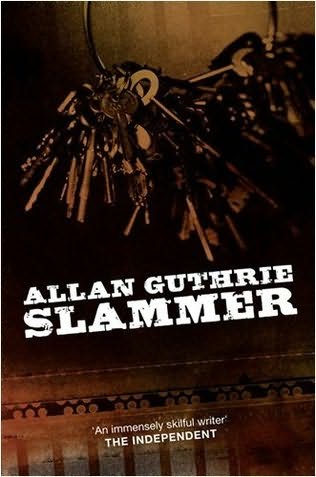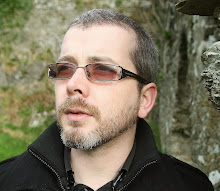
Allan Guthrie writes crime fiction. He was born in Orkney, but has lived in Edinburgh for most of his adult life. He is married to Donna.
His first novel, Two-Way Split, was shortlisted for the CWA Debut Dagger and went on to win the 2007 Theakston's Old Peculier Crime Novel Of The Year. His second novel, Kiss Her Goodbye, was nominated for Edgar, Anthony and Gumshoe awards. He is also the author of the novels Hard Man and Savage Night, plus a novella, Kill Clock, for emergent adult readers.
Visit his website at http://www.allanguthrie.co.uk/.
SLAMMER, Guthrie’s latest novel, will be released this month.
I caught up with Allan Guthrie and bugged him with a few questions. Knowing how busy he is trying to sell other peoples’ novels as an agent at Jenny Brown Associates, as well as writing his own, I kept it pretty short.
Enjoy.
Gerard Brennan: As the title would suggest, SLAMMER is a novel set in prison. You’re a law-abiding citizen (that’s the rumour anyway), so I imagine you had quite a lot of research to do. How did you go about it?
Allan Guthrie: Who’s been spreading rumours about me? I deny everything! Law-abiding or not, I was lucky with SLAMMER. To a large extent, the research came first. I’d always fancied writing a prison novel. I even wrote one – of sorts – when I was a teenager. A pile of bollocks it was, too. But since I’ve been writing professionally, the idea of a prison novel’s always been at the back of my mind. And that’s where it stayed until, one afternoon at the day job, I got talking to an ex-prison officer who’d joined the company as a security guard, and that conversation (and several subsequent ones) provided a lot of the type of details I look for – you know, the kind of killer detail that convinces the reader you know what you’re talking about. Got me enthused about finally writing that prison novel – one that wasn’t a terrible pile of bollocks, that is. I still didn’t have a story, but that came to me later. I did a lot of background reading too: Jimmy Boyle, James Campbell, Erwin James, Malcolm Braly.
GB: It’s inevitable that a writer who’s honest with himself can find areas to improve with each novel written. I have it on good authority that you care about the craft of writing, so I reckon you fall into this ‘honest writer’ category. That said, what pleased you most about this novel with regards to the writing, characters and plot? No spoilers, though!
AG: That’s a tough question to answer. I tend to keep rewriting until I hit my deadline, otherwise I’d probably keep writing the same book forever. I rewrote TWO-WAY SPLIT for about four years and I’ve even rewritten it since it was published. And SAVAGE NIGHT went through over thirty drafts. So it’s probably true to say that I’m rarely that pleased with much of what I write. There’s certainly always room for improvement. But if I had to choose the aspect of SLAMMER that I think is the strongest, it would probably be the way the narrative unfolds. It’s a tricky story to tell, and Nicholas Glass is a tricky character to tell it. But I think I just about manage to handle all the trickiness okay.
GB: Will SLAMMER be a standalone novel, or can you see potential in it for a sequel or beyond?
AG: It’s a standalone.

GB: What are you working on right now?
AG: A thriller called BLOOD WILL OUT.
GB: I’m going slightly off topic here, but this is something CSNI readers will find interesting – You edited the Ken Bruen and Reed Farrel Coleman collaboration, TOWER, which is due out this year. Good fun?
AG: It’s always a pleasure to work on a quality book with great writers. And a great publisher too in David Thompson of Busted Flush. There’s a lot to learn from reading Bruen and Coleman up close, and they’re both absolute gentlemen to work with. Very much looking forward to TOWER hitting the shelves later this year.
GB: Given the choice of any writer in the world (but let’s say living), who would you most like to collaborate with?
AG: Garth Ennis. I’m late to the party, only recently discovered him, but he’s a writer I could learn a lot from. And he makes me laugh my arse off.
GB: If you had to give SLAMMER, the 25 word Hollywood pitch, how would it go?
AG: When a group of cons use outside help to threaten young prison officer Nicholas Glass’s wife and daughter, Glass agrees to help them with a ‘favour’. But, as their threats escalate, and one favour leads to another, Glass grows ever closer to breaking point...
GB: Thanks for taking the time, Allan!




12 comments:
Another great interview, Gerard! I also have to applaud your agentt for never succumbing to the draw of series novel writing. Which is why he has endured as one of my favorite writer's over the years. I don't know how he can rewrite a book 30 times, I have a tough time doing a single rewrite on a 5000 word short, so I can't even imagine doing it 30 times over at 60,000 words!
Cheers, Keith.
You're not a fan of series novels? Can't say I'm against them to be honest.
I'm with you on the re-write front, though I'm a VERY slow edit-while-I-go kind of writer. Maybe that's the difference?
gb
It's not that I don't like series fiction--some of my favorite writer's (Bruen, Connolly, Harvey, Hughes, that new guy McGilloway) pretty much write series fiction exclusively--it's just that crime fiction seems to use series fiction like a crutch. The only problem with this is that it's not breaking any new ground and I also believe the sheer number of series deters the casual reader from picking up a novelist who exclusively writes in a series format. Where as with books like the ones written by Guthrie, Charlie Stella, Duane Swierczyski, Jason Starr, Megan Abbott, etc., the books are exclusively stand alone, but still share the same universe with previous novels. I love this style because it preserves continuity with out the reader having to go back and read previous novels to understand the current story line.
Oi, that was a mouthful
Oi, that was a mouthful
Maybe, but a good one. Well said, Keith.
Keith - Of all the series writers you've mentioned, I think I like Bruen's method the best. He does series and standalones, which gives the reader more options. Colin Bateman does this too.
I'm also a McGilloway, Hughes et al fan, but yeah, I can see what you're saying. For instance, if I find a book that's tenth or eleventh in a series, it's unlikely that I'll go back to the start of the series.
I still haven't read Abbot, though I enjoyed her latest interview on Crime Always Pays. Fancy recommending a good starting point for her work?
Seana - Thanks for encouraging him. These comments make the blog look popular.
gb
Thanks for the generous comments, Keith! The reason I can rewrite a book 30 times is entirely down to the embarrassment of how shite it would be if I didn't. On the series front: I couldn't help noticing that none of the authors you cite (me, Stella, Swierczynski, Abbott, Starr) write detective fiction. If a writer goes to the trouble of setting up a fictional police force and they write about the same city book after book, it would be a major pain to have to re-invent it every time. You could, of course, but I'm not sure what the benefits would be, and surely you'd struggle to present the idea of the books taking place in the same universe. When the police are generally peripheral players in your stories, though, that's rarely an aspect you have to concern yourself with. Full disclosure: the book I'm working on now is shaping up to be my first detective novel. I fancied a fresh challenge and my Christ is it that!
Al, I'll be interested in seeing your take on the detective novel. I'm so use to you taking on crooks, it'll be cool to see your take on the coppers! And as far as cop novels are concerned, I'm not asking authors to invent the wheel. If you're writing a cop novel (Such as Mr.McGilloway or John Harvey.)it makes sense to have reoccuring characters. But in the case of a PI novel, well I tend to think author's tend to go a little over board (I'll read James Lee Burke and Bill Pronzi the riot act on this particularly.)
Gerard, I like how Ken works in series as well, which is why I've stuck it out with the Taylor and Brant series for so long. (other than the fact that Ken is simply a kick ass novelist.)But I will say that I enjoyed Once were Cops more than a novel he's released in recent memory.
And as far as starting off point with Abbott, This Song is You ranks as one of my top ten noir's. The book is just creepy and a great, fast paced read.
I really liked how John McFetridge's two books (and probably the third one coming) are set in the same Toronto seen from slightly different angles- they are ensemble novels with a shifting cast of characters that can be read as standalones. Events of the first novel have consequences in the second, some characters who were at the forefront in the first are briefly seen passing through the narrative of the second at a different stage in their personal journey, while some others have a more prominent role in both ,but still are not the central characters in either one.
Marco,
I'll agree with you about John's stuff. I loved Dirty Sweet and Everybody knows this is No where, and I have high hopes that Swap(?) will add more characters. I personally wish more novelists would follow John's lead, in my opinion it would attract more readers in the long term.
I managed to sneak an advance copy of McFetridge's new one and it's outstanding.
Man, it must be cool being a novelist and an agent? Go ahead, Al, admit it?
Great bit of discussion going on here, guys. I'll not interfere other than to thank Keith and Marco for their always interesting comments and to thank Al for stopping by.
Oh, and John McFetridge rocks.
Cheers
gb
Post a Comment